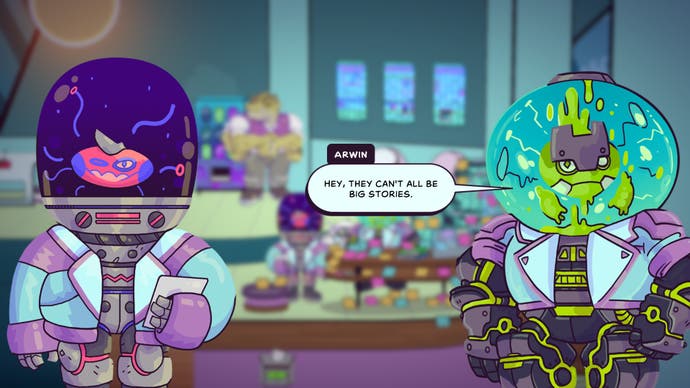Times & Galaxy sees you shaping the narrative as a robo-journalist
And there's a demo out now.
I've played a couple of games where I've been cast as a journalist, but in most of these games you're a journalist in the same way Tintin is a journalist - kind of, but not too much. Beyond Good & Evil probably takes it the most seriously. You're a photographer trying to get the truth about an alien invasion. You break into places and have fights and solve puzzles, but you also get the shots you're after before you get out. But still, you know, the fights, the breaking in, the solving puzzles. You're a journalist, kind of...
Times & Galaxy, which was announced this week goes much further. (There's a demo here so you can see it for yourself.) Suddenly I'm a journalist who's expected to go and research actual events, build a sense of what happened and then sculpt a story afterwards. Sure, it's the future and I'm also a robot exploring a colourful sci-fi world, but it goes a lot deeper than I had expected.
On my first mission I'm sent to a planet to write up an RTA. But as I chat to people things start to get strange. A ship crashed because the cops were chasing it, but the cops won't take any blame for a crime they caused in the line of duty. Furthermore, there didn't appear to actually be anybody in crashed ship, and the flight recorder is missing.
For a few happy minutes I go back and forth, meeting bystanders, interviewing them, trying to create a sense of the event and work out who's telling the truth and who's hiding something. Eventually, after a bit of poking through the wreckage, I find a robot that was installed in the ship as an autopilot, but which tried to escape the factory they were made in because the robots were being mistreated during testing.
All of this is fascinating, but what happens next absolutely floors me. I don't just file the story in Times & Galaxy. I have to construct it, and in constructing it I get to shape the final sense of what happened. I can write this up as a story of heroic cops or a story of runaway autopilot bots. Or I can write it up as a story of a heroic runaway autopilot bot. Alongside headlines, I need to select a lede and a nut graf and quotes and all that jazz, all of which have new options made available depending on how many people I spoke to and, ultimately, how diligently I did my job.
Once the story is filed, it's graded for accuracy and level completing and I also get a sense of where it's sent the overall debate going on in this universe. It's a fascinating way of doing things, and judging by the first few missions in the demo I've played, beneath the jokey sci-fi stuff there's quite a serious point being made about prejudice and how the media covers identity issues.
There's lots more to the game than this, of course. There's a newsroom hub with plenty of people to talk to and there's a sense that even twenty minutes in the game is already straining against its ambitions rather wonderfully. But what struck me forcefully was what a nuanced take on the realities of newsgathering this is. I can't wait to play more.











